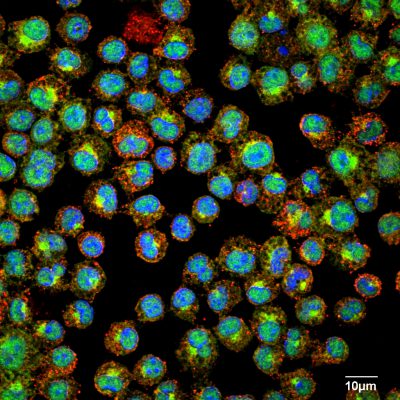
The National Institutes of Health have awarded a $411,987 grant to Dr. Adam Moeser, associate professor and Matilda R. Wilson Endowed Chair for the Department of Large Animal Clinical Sciences, for his project titled “Origins of Sex Differences in Mast Cell Associated Immune Diseases.” This study aims to identify therapies that will treat and prevent mast cell-related disorders in humans and animals.
Moeser, an expert in stress biology and mast cells, is collaborating with MSU investigators Drs. Cindy Jordan, an expert in the biology of sex differences, and AJ Robison, an expert in epigenetics and neurobiology. Together, these researchers will work to establish the role of early-life sex hormones on epigenetic programming of mast cells as a mechanism for sex-specific susceptibility or resiliency to immune diseases throughout the lifespan.
One such mast cell-related disease is irritable bowel syndrome (IBS), an intestinal disorder that can cause abdominal pain, cramping, constipation, and diarrhea. While IBS affects almost one quarter of the US population, women are up four times more likely than men to develop IBS. According to Moeser, it may be tied to sex differences in mast cells, which play a central role in the body’s stress and immune responses.
Previously, the Moeser Laboratory revealed that mast cells from females have an increased capacity to form, store, and release chemicals that mediate anaphylaxis and stress. In animal models, this has correlated with more severe manifestations of certain GI and allergic diseases. The same pattern is observed in children and adults.
Previous research investigating the mechanisms of sex differences in IBS and other mast cell-associated disorders, such as anaphylaxis, allergy, and migraines, has focused almost exclusively on the role of adult sex hormones, particularly estrogen. However, that sex biases in mast cell-associated disorders exist in prepubertal children and animals indicates that early-life factors are driving sex differences. These early origins of sex differences and lifelong risks for mast cell disease have yet to be defined, which is the focus of Moeser’s NIH grant.
“Identifying when and how sex differences in mast cells emerge in this grant will be critical to understanding why females are more vulnerable or males are more resilient to mast cell disease,” says Moeser. “Based on our research, we hypothesize that this difference is established very early in life and is, in large part, due to the actions of perinatal androgens (sex hormones).”
Moeser’s two-year NIH R21 Exploratory/Development Grant from the National Institute of Allergy and Infectious Diseases (NIAID) will support his study of the developmental origins and biological mechanisms in mast cells by which females are more prone to, or males are more resistant to, certain disorders, such as IBS, allergic inflammation, autoimmune diseases, and other stress-related diseases. As part of their investigation, the Moeser Laboratory will identify at which point in development sex differences emerge in the characteristics of mast cells and the contribution of perinatal androgens and resultant epigenetic modifications to mast cells, which lead to sex differences in disease susceptibility.
“We will use biological sex as an experimental tool to identify the mechanisms of mast cell disease risk and to potentially identify sex-specific therapeutic targets for preventing and treating debilitating mast cell disorders in both sexes,” says Moeser.
For more information on this research, contact the MSU College of Veterinary Medicine.
